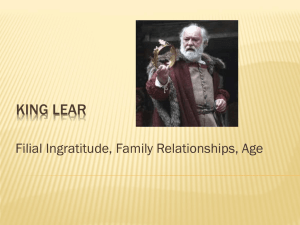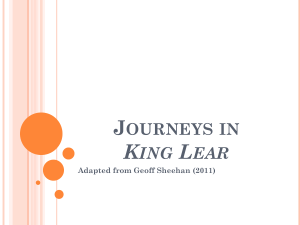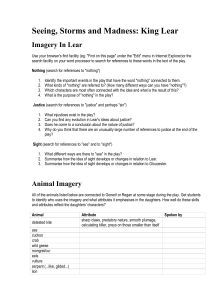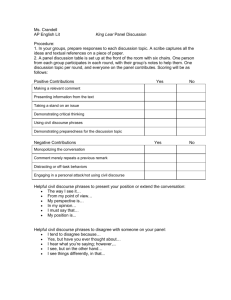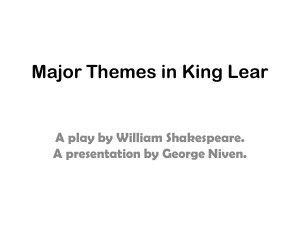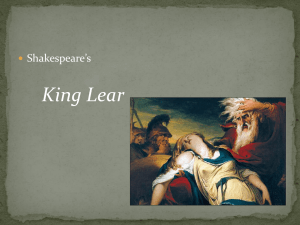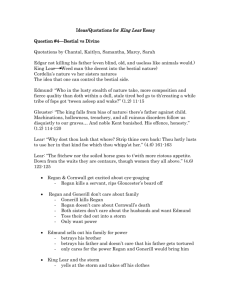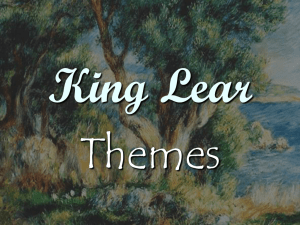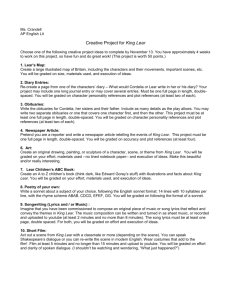King Lear
advertisement
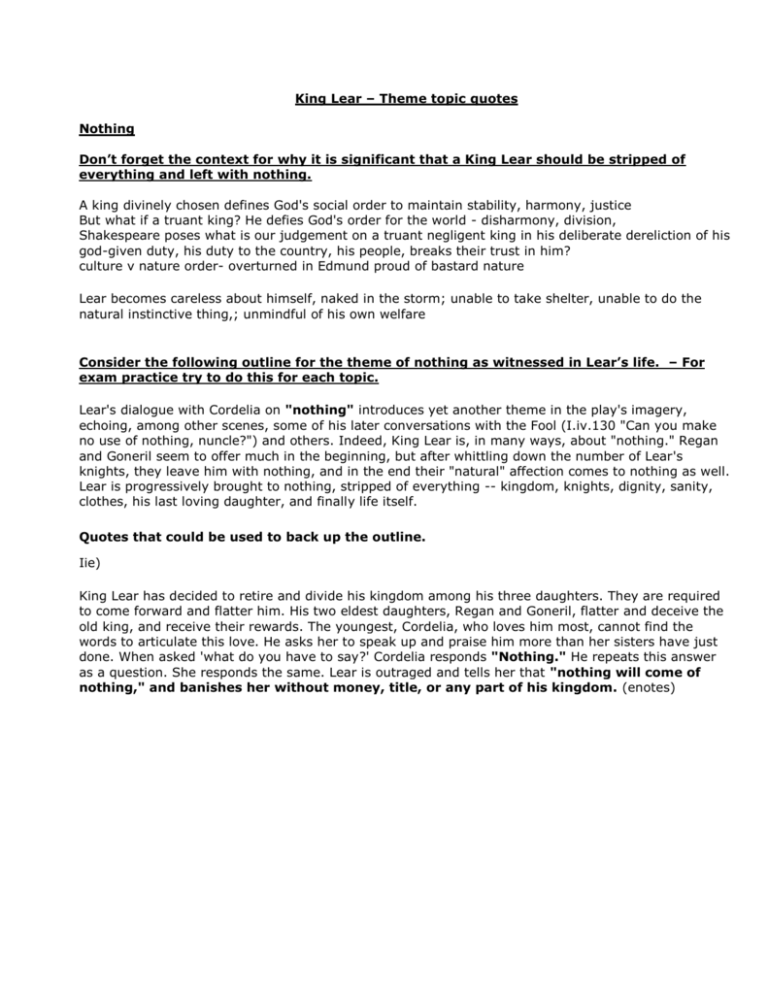
King Lear – Theme topic quotes Nothing Don’t forget the context for why it is significant that a King Lear should be stripped of everything and left with nothing. A king divinely chosen defines God's social order to maintain stability, harmony, justice But what if a truant king? He defies God's order for the world - disharmony, division, Shakespeare poses what is our judgement on a truant negligent king in his deliberate dereliction of his god-given duty, his duty to the country, his people, breaks their trust in him? culture v nature order- overturned in Edmund proud of bastard nature Lear becomes careless about himself, naked in the storm; unable to take shelter, unable to do the natural instinctive thing,; unmindful of his own welfare Consider the following outline for the theme of nothing as witnessed in Lear’s life. – For exam practice try to do this for each topic. Lear's dialogue with Cordelia on "nothing" introduces yet another theme in the play's imagery, echoing, among other scenes, some of his later conversations with the Fool (I.iv.130 "Can you make no use of nothing, nuncle?") and others. Indeed, King Lear is, in many ways, about "nothing." Regan and Goneril seem to offer much in the beginning, but after whittling down the number of Lear's knights, they leave him with nothing, and in the end their "natural" affection comes to nothing as well. Lear is progressively brought to nothing, stripped of everything -- kingdom, knights, dignity, sanity, clothes, his last loving daughter, and finally life itself. Quotes that could be used to back up the outline. Iie) King Lear has decided to retire and divide his kingdom among his three daughters. They are required to come forward and flatter him. His two eldest daughters, Regan and Goneril, flatter and deceive the old king, and receive their rewards. The youngest, Cordelia, who loves him most, cannot find the words to articulate this love. He asks her to speak up and praise him more than her sisters have just done. When asked 'what do you have to say?' Cordelia responds "Nothing." He repeats this answer as a question. She responds the same. Lear is outraged and tells her that "nothing will come of nothing," and banishes her without money, title, or any part of his kingdom. (enotes) The Natural Order Be reminded of the context for this topic as well as Nothing: A king divinely chosen defines God's social order to maintain stability, harmony, justice But what if a truant king? He defies God's order for the world - disharmony, division, Shakespeare poses what is our judgement on a truant negligent king in his deliberate dereliction of his god-given duty, his duty to the country, his people, breaks their trust in him? culture v nature order- overturned in Edmund proud of bastard nature Lear becomes careless about himself, naked in the storm; unable to take shelter, unable to do the natural instinctive thing,; unmindful of his own welfare Act 1, Scene 1 Nature 1: This is the introduction of Edmund, Gloucester's illegitimate son. The natural order states that Edmund will not inherit his father's estate; the property and goods will go to the legitimate son, Edgar. Edmund will see how his efforts to reverse the natural order do not pay off in the end. Yet Gloucester is at fault for blindly rejecting Edmund, who is still his son. (lines 7-33) Act 1, Scene 2 Nature 2: Edmund begins to speak out against his illegitimacy, and calls on nature to stand by his efforts to get hold of what he believes is rightfully his. (lines 1-22) Act 1, Scene 4 Nature 3: The Fool chastises the king for giving up his coronet, saying that the king reversed the natural order in the first place when he decided to give his kingdom to his daughters. Lear is unleashing a horrible calamity when he tries to reverse the natural order and retire at an earlier age. (lines 1-90) Nature 4: Once Lear decides to abandon Goneril, too, he calls upon nature to make her sterile forever so she might never have children. He is asking nature to defend him with quite a cruel request. (lines 191-280) Act 1, Scene 5 Nature 5: The king begins to crack here because he has abandoned two of his daughters, Goneril and Cordelia. The Fool, who is actually a wise man, tells the king that he grew old before he gained wisdom; again, a reversal of the natural order. The king calls upon heaven to support him. He is constantly trying to use nature to support his wrongful deeds. Act 2, Scene 1 Nature 6: Edmund dupes Gloucester into thinking that Edgar, the legitimate son, is actually a villain. Gloucester is so impressed with Edgar's loyalty to the family honor that he reverses the natural order and declares Edmund the new heir to the kingdom. (lines 32-85) Act 2, Scene 2 Nature 7: Kent calls upon Fortune to turn its wheel once more, this time in his favor. Many of the characters in the play often call upon Fortune (aka. fate, luck), to work in their favor. Here, Kent wants Fortune to free him from the stocks. (lines 40-169) Act 3, Scene 1 Nature 8: Kent enters the scene and speaks of an oncoming apocalyptic storm, the kind no human could battle. This is nature's way of reacting to the story, and the many attempts at reversing the natural order. Act 3, Scene 2 Nature 9: As Lear is beginning his downward spiral toward insanity, the wise Fool notes that England will suffer because of it. He says Fortune will turn against England. Act 3, Scene 3 Nature 10: Gloucester complains to Edmund that Cornwall and Regan have suddenly assumed authority in his home, how it is a reversal of all that is natural. Edmund lies and pretends to agree with his father, but it is clear he is lying since he, too, wants to reverse all that is natural. Act 3, Scene 4 Nature 11: Edgar, the original heir to the kingdom of Gloucester and son of the earl, comes out dressed like a mad beggar. His role as such is a complete reversal of the role he was given by birth. (lines 37-107) Act 4, Scene 1 Nature 12: Gloucester is alone with the mad beggar in the woods, ignorant that the beggar is his son. He is certain that he will soon die, noting that Fortune's wheel is never standing still and could easily turn against him. Yet it is now that Edgar, dressed as the beggar, begins to take control and lead his father down the right path. He is now supporting his father who has become blinded and helpless. Act 4, Scene 6 Nature 13: Edgar convinces Gloucester he is alive, after Gloucester believes he has fallen off a cliff and died. Edgar launches into a small speech, praising the gods for preserving Gloucester. Really, though, Gloucester never fell farther than two feet. (lines 1-80) Nature 14: Lear refers to himself here as "the natural fool of Fortune," noting that he has led himself out of Fortune's favor. He recognizes the power of fate and the natural order. (lines 80-199) Act 4, Scene 7 Nature 15: A caring Cordelia comes in to find her father sleeping. When she kisses him to wake him, he thinks nature has sent him to heaven. Once he realizes he is alive, he berates himself for being so foolish his whole life. (lines 44-97) Act 5, Scene 1 Nature 16: Lear and Cordelia are taken hostage and gets upset. Edgar reminds him, though, that there is nothing he can do--nothing can reverse Fortune's natural order. It is up to the gods to determine their fate. Act 5, Scene 2 Nature 17: Cordelia is upset that Fortune has turned against her and her father when Edmund sends them to prison, but Lear is happy to go to jail. He thinks it will be peaceful for him. The possibility of death does not cross his mind, even though at this point it is likely. (lines 1-25) Act 5, Scene 3 Nature 18: Edgar reveals himself from behind his beggar garb and becomes a hero. The natural order is again established when Edmund realizes he has been defeated. Fortune's wheel has come full circle, and cast him in a lesser role, as was his fate. (lines 155-222) Nature 19: Lear is once again given absolute power, though his death soon follows. The natural order is restored. (lines 238-327) AND The growing chaos of Lear's world is the distortion of familial and social ties. King Lear exiles his favorite daughter, Cordelia, for a trifling offense, and those daughters he does favor soon turn against him. The simple virtues of trust, care and respect are central; dismiss these and chaos follows. Sight (which is insight) Act 1, Scene 1 1: Cordelia refused to pander to her father's petty interests. She can see right through him and refuses to succumb to his wishes. Her actions here kick off the main theme of the play. Vision is usually associated with intelligence, and blindness with misbehavior or self-delusion. (lines 59-76) Act 1, Scene 2 Vision 2: Edgar is temporarily blinded by his brother's greed. Edmund is attempting to formulate a scheme that, far down the road, will establish him as the main heir to the kingdom, instead of Edgar. Edmund is trying to plan far into the future, but his vision is clearly blurred. (lines 130-177) Act 2, Scene 4 Vision 3: The Fool emerges as an interesting character because he does not live up to his name. All throughout the play, and beginning here, he is clearly the wisest man with the most pragmatic and straightforward perspective. He is smart enough to both dupe the king and convince the king of what is right. (lines 60-83) Act 3, Scene 4 Vision 4: The king becomes aware of his own frailties, and for the first time his vision is not so clouded. He is starting to see the difference between right and wrong, good and evil. It's interesting that he comes up with his clearest insights in the midst of his insanity. (lines 28-36) Vision 5: Edgar is the hero of the play, and his time disguised as a beggar only exists so he can further see the truth. (lines 37-107) Vision 6: Lear is realizing his past blindnesses when Gloucester arrives in the woods. Gloucester's inability to see past his own blindness--by failing to recognize his own son dressed as a beggar-highlights Lear's somewhat insane advances. (lines 108-175) Act 3, Scene 7 Vision 7: Cornwall physically plucks out Gloucester's eyes. Literally, Gloucester is unable to see from this point onward. The metaphor extends itself into a physical manifestation and its reversal--as he is blinded, Gloucester discovers the truth about his sons and realizes he's been blind all along. (lines 27107) Act 4, Scene 1 Vision 8: Edgar sees his father for the first time in a while, and discovers his blindness. He realizes that his own life is indeed not the "worst." There is always something lower. He begins to see that he will always need to support his father from this point onward. (lines 1-79) Act 4, Scene 2 Vision 9: Albany can see through Regan and Goneril's greed quite easily. They yell at him and chastise him, but he doesn't care because he knows they are evil underneath the surface. (lines 29-68) Act 4, Scene 4 Vision 10: Cordelia enters the scene and finds her father in his state of insanity. She understands she must care for him from this point onward. She can see his good side, even though he has gone crazy and abandoned her. She knows that, despite his mental illness, her father does indeed still love her. Act 4, Scene 6 Vision 11: Lear is quite a different person than he was in the beginning. He is covered in flowers and weeds, both humble and natural. He says that his royal garb and showy accessories were blinding him when he was king. He says he has gained a new vision from seeing what is real. (lines 80-199) Act 5, Scene 3 Vision 12: Lear is being sent to prison with Cordelia and the possibility of death does not faze him. It's because this is the first time, and sadly the last, when he is entirely content with his free self and his clarity of the world. Perhaps this is the first time Lear can really see the world for what it is. (lines 125) AND Sight, Shakespeare comments on the necessity of having sight and understanding the consequences of a lack of insight before acting (as Lear does not). - The destruction of Gloucester's eyes and his subsequent musings ("I stumbled when I saw" (IV.i.19) etc.) are a more graphical presentation of this basic theme which originally appears in Lear's first scene. - Goneril declares Lear is "dearer than eyesight" (I.i.56) to her (though she is the one who later suggests putting Gloucester's eyes out for his "treachery"). - Regan goes further, proclaiming "I profess / Myself an enemy to all other joys / Which the most precious square of sense possesses" (I.i. 72-74). - Crossed in his wrath by Kent, Lear cries "Out of my sight!" (I.i.157), only to be reproved with Kent's "See better, Lear, and let me still remain / The true blank of thine eye." (I.i.158-9). EVIL AND JUSTICE The division among 20th Century critics in their interpretations suggests that Shakespeare may have left it to his audiences to provide the answer to the problem of good and evil. It is possible to isolate passages, each of which seems to provide an answer. 1. Kent, placed in the stocks at the order of the cruel Duke of Cornwall, exclaims: "Fortune, goodnight! Smile once more; turn thy wheel!" (II, ii 180). Later in the play, referring to the evil sisters in contrast to the virtuous Cordelia, he states: It is the stars, The stars above us, govern our conditions, Else one self make and make could not beget Such different issues. Evil and Justice cont’d In both instances, Kent seems to find in chance, or blind fate, the answer to the problem of evil. It could be argued that he accepts the medieval view of tragedy, according to which, in an unstable world, good and evil alike are subject to the whims of fortune. Or, to introduce a related idea, Kent seems to embrace astrological determinism and implies that nature itself makes things good and evil. Free choice and human responsibility have no place in such a philosophy. 2. In contrast, Lear driven out into the storm by his own wicked daughters, asks: "Is there any cause in nature that makes these hard hearts?" (III iv 81-82). This question may imply that evil in the world remains an unsolvable mystery. Very near the end of the play, the old king enters with the dead Cordelia in his arms. "No, no no life!" he exclaims and then asks the devastating question which points to the universe devoid of saving grace and justice: "Why should a dog, a horse, a rat have life/And thou no breath at all?" (V.iii 305-7). Lines spoken by blinded Gloucester earlier in the play have been accepted by some critics as the answer to Lear's question: As flies to wanton boys are we to the gods; They kills us for their sport...(IV i. 38-39). 3. But there are other passages which point to a moral universe and to benificent higher powers concerned with man's destiny. Albany, appalled at the spectacle of evil following the blinding of Gloucester, voices what amounts to a prayer that there are heavenly spirits, visible ones, to "tame these wild offenses". (IV ii 46ff). And after Gloucester has survived the imaginative at Dover, his devoted son Edgar says to him: Think that the dearest gods, who made them honours of men's impossibilities have preserved the... (IV. Vi. 73-74). 4. When Edgar identifies himself to his mortally wounded half brother, he says: My name is Edgar, and they father's son. The gods are just, and of our pleasant vies Make instruments to plague us. The dark and vicious place where thee he got Cost him his eyes. 5. To which Edmund, herefore depicted as the last one to endorse the concept of poetic justice, replies: Thou has spoken right 'tis true, The wheel is come full circle, I am here. (V. iii 169-174) 6. After enduring almost incredible suffering, physical and mental, Lear is at last united with Cordelia the very embodiment of love; following the curative sleep, his reason is restored. But immediately after his reconciliation and healing, we are confronted with the death of Cordelia and then of Lear. To be sure, the fates of the grossly evil Cornwall, General and Regan are (as Albany foresaw) the monstrous preying of humanity on itself. And Gloucester's illegitimate son Edmund is killed by the virtuous Edgar. The wicked are indeed punished. But why the repentant Lear, the once wilful king who had learned at great cost the lesson of humility and how to distinguish appearances from reality should be made to endure the loss of Cordelia and to die in an excess of passion poses the greatest of critical problems. Dowden (1875) Stoic interpretation of the play - emphasis heroism and dignity of man: The ethics of the play of King Lear are stoical ethics. Shakespeare's fidelity to the fact will allow him to deny no pain or calamity that befalls man.... He admits the suffering, the weakness of humanity but he declares that in the inner law there is a constraining power stronger than a silken thread; in the rapture of love and sacrifice, there is a charm which is neither air nor words, but, indeed, potent enough to endure pain and make calamity acceptable. 7. Dowden pointed out that Shakespeare's intention is not to teach any moral truth, but rather to present "a vision of life and of the enveloping forces of nature". He adds "each of the principle personages of the play is brought into the presence of mysterious powers which dominate life and preside over human destiny; and each, according to his character, is made to offer an interpretation of the great riddle. Of these interpretations, none is adequate to account for all the facts". 8. Christian Interpretation - for critics who hold this view, the play is purgatorial and the hero dies "of peace" with his condition. Ribner: King Lear asserts the perfection of God's harmonious order and the inevitable triumph of justice, with the forces of evil preying upon and destroying themselves. In the process they subvert the good, but finally good must be victorious. Essay Sample In Shakespeare's classic tragedy, King Lear, the issue of sight and its relevance to clear vision is a recurring theme.Shakespeare's principal means of portraying this theme is through the characters of Lear and Gloucester. Although Lear can physically see, he is blind in the sense that he lacks insight, understanding, and direction. In contrast, Gloucester becomes physically blind but gains the type of vision that Lear lacks. It is evident from these two characters that clear vision is not derived solely from physical sight. Lear's failure to understand this is the principal cause of his demise, while Gloucester learns to achieve clear vision, and consequently avoids a fate similar to Lear's. Throughout most of King Lear, Lear's vision is clouded by his lack of insight. Since he cannot see into other people's characters, he can never identify them for who they truly are. When Lear is angered by Cordelia, Kent tries to reason with Lear, who is too stubborn to remain open-minded. Lear responds to Kent's opposition with, "Out of my sight!," to which Kent responds, "See better, Lear, and let me still remain" (I.i.160). Here, Lear is saying he never wants to see Kent again, but he could never truly see him for who he was. Kent was only trying to do what was best for Lear, but Lear could not see that. Kent's vision is not clouded, as is Lear's, and he knows that he can remain near Lear as long as he is in disguise. Later, Lear's vision is so superficial that he is easily duped by the physical garments and simple disguise that Kent wears. Lear cannot see who Kent really. He only learns of Kent's noble and honest character just prior to his death, when his vision is cleared. By this time, however, it is too late for an honest relationship to be salvaged. Lear's vision is also marred by his lack of direction in life, and his poor foresight, his inability to predict the consequences of his actions. He cannot look far enough into the future to see the consequences of his actions. This, in addition to his lack of insight into other people, condemns his relationship with his most beloved daughter, Cordelia. When Lear asks his daughters who loves him most, he already thinks that Cordelia has the most love for him. However,when Cordelia says, "I love your Majesty/According to my bond, no more nor less" (I.i.94-95), Lear cannot see what these words really mean. Goneril and Regan are only putting on an act. They do not truly love Lear as much as they should. When Cordelia says these words, she has seen her sisters' facade, and she does not want to associate her true love with their false love. Lear, however, is fooled by Goneril and Regan into thinking that they love him, while Cordelia does not. Kent, who has sufficient insight, is able to see through the dialogue and knows that Cordelia is the only daughter who actually loves Lear. He tries to convince Lear of this, saying, "Answer my life my judgment,/Thy youngest daughter does not love thee least" (I.i.153-154). Lear, however, lacks the insight that Kent has. He only sees what is on the surface, and cannot understand the deeper intentions of the daughters' speeches. As his anger grows from the argument, his foresight diminishes as he becomes increasingly rash and narrow minded . When Lear disowns Cordelia, he says, "we/Have no such daughter, nor shall ever see/That face of hers again" (I.i.264-266). He cannot see far enough into the future to understand the consequences of this action. Ironically, he later discovers that Cordelia is the only daughter he wants to see, asking her to "forget and forgive" (IV.vii.85). By this time, he has finally started to gain some direction, and his vision is cleared, but it is too late for his life to be saved. His lack of precognition had condemned him from the beginning. Lear depicts Shakespeare's theme of clear vision by demonstrating that physical sight does not guarantee clear sight. Gloucester depicts this theme by demonstrating clear vision, despite the total lack of physical sight. Prior to the loss of his eyes, Gloucester's vision was much like Lear's. He could not see what was truly going on around him. Instead, he only saw what was presented to him on the surface. When Edmund shows him the letter that is supposedly from Edgar, it takes very little convincing for Gloucester to believe it. As soon as Edmund mentions that Edgar could be plotting against him, Gloucester calls him an "Abhorred villain, unnatural, detested, brutish villain" (I.ii.81-82). He does not even stop to consider whether Edgar would do such a thing because he cannot see into Edgar's character. At this point, Gloucester's life is headed down a path of damnation similar to Lear's because of a similar lack of sight. When Gloucester loses his physical sight, his vision actually clears, in that he can see what is going on around him. When Gloucester is captured by Cornwall, Gloucester provokes him to pluck out his eyes: But I shall see The wingèd vengeance overtake such children. Cornwall. See't shalt thou never. Fellows, hold the chair. Upon these eyes of thine I'll set my foot. (III.vii.66-69) When Gloucester is saying this, he still lacks clear vision, and would never have seen vengeance taken upon Cornwall. When Cornwall puts out his eyes, Gloucester's vision becomes clear from this point on, and he later discovers that Cornwall was killed. Ironically, Gloucester does not see vengeance until after he is blinded. In this sense, Cornwall also suffers from clouded vision because his death is a direct result of his blinding of Gloucester, when a servant kills him. As a result, Gloucester is spared and his vision is cleared, while Cornwall is left a victim of his own faulty vision. From this point onwards, Gloucester learns to see clearly by using his heart to see instead of his eyes. It is evident that he realizes this when he says: I have no way and therefore want no eyes; I stumbled when I saw. Full oft 'tis seen, Our means secure us, and our mere defects Prove our commodities. (IV.i.18-21) In this, he is saying that he has no need for eyes because when he had them, he could not see clearly. He realizes that when he had eyes, he was confident that he could see, while in reality, he could not see until his eyes were removed. Afterwards, he sees with his mind instead of his eyes. Gloucester's vision can be contrasted with that of Lear. While Lear has the physical sight that Gloucester lost, Gloucester has the clearer vision that Lear will never gain. When Lear and Gloucester meet near the cliffs of Dover, Lear questions Gloucester's state: No eyes in your head, nor no money in your purse? Your eyes are in a heavy case, your purse in a light, yet you see how this world goes. Gloucester. I see it feelingly. (IV.vi.147-151) Here, Lear cannot relate to Gloucester because his vision is not clear, and he wonders how Gloucester can see without eyes. Although Lear has seen his mistakes, he still believes that sight comes only from the eyes. Gloucester tells him that sight comes from within.Vision is the result of the mind, heart, and emotions put together, not just physical sight. This is a concept that Lear will never understand. In King Lear, clear vision is an attribute portrayed by the main characters of the two plots. While Lear portrays a lack of vision, Gloucester learns that clear vision does not emanate from the eye. Throughout this play, Shakespeare is saying that the world cannot truly be seen with the eye, but with the heart. The physical world that the eye can detect can accordingly hide its evils with physical attributes, and thus clear vision cannot result from the eye alone. Lear's downfall was a result of his failure to understand that appearance does not always represent reality. Gloucester avoided a similar demise by learning the relationship between appearance and reality. If Lear had learned to look with more than just his eyes, he might have avoided this tragedy.

